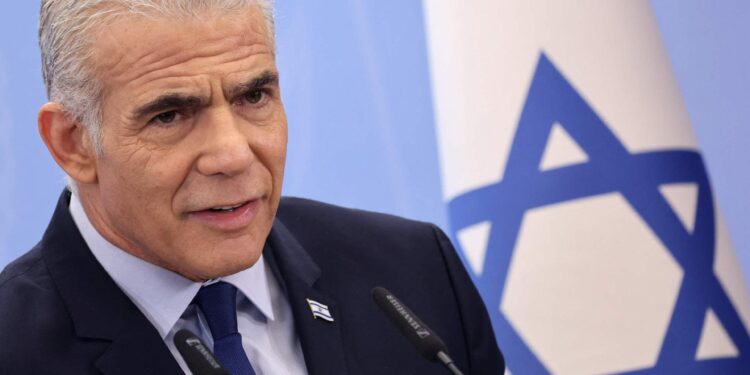On Sunday, Israeli opposition leader Yair Lapid described Moody’s credit rating agency’s decision to lower Israel’s rating two notches at once, as an indication that the country is sinking into economic mud due to mismanagement.
Lapid said – in an interview with Israeli Public Radio today – “When Finance Minister Bezalel Smotrich says that Moody’s downgrading of Israel’s credit rating came because of the war, we must not believe him… We are drowning in economic mud due to mismanagement.”
On Friday evening, Moody’s lowered Israel’s credit rating by two notches to Baa1 from A2, its lowest level ever.
Moody’s – which had previously lowered Israel’s credit rating during the current year as well – said that the main motivation for lowering the credit rating is that “geopolitical risks have increased significantly to very high levels, with the consequent material negative consequences on Israel’s creditworthiness in the long term.” “Near and far.”
The new classification means that Israel’s attractiveness to issue foreign debt instruments will be costly, and will confuse investors in buying debt instruments, due to the high risks surrounding them.
Yesterday, Saturday, Smotrich confirmed that the Israeli economy is “strong even after Moody’s lowered the country’s sovereign rating by two notches.”
He described the war that his country is waging today on the Gaza Strip and southern Lebanon as “a war for our existence, and we must continue it until victory, so that we can live for many years in peace, security, and economic growth.”
He added, “After we win the war, even those who lowered our rating will return it to the real level.”
The fighting escalated
While Moody’s gives Israel the lowest rating of “BAA1”, which is equivalent to “BBB” by other agencies, Fitch and Standard & Poor’s give Israel a higher rating of “A”.
This comes in light of the escalation of fighting with Hezbollah in Lebanon, as Israel launched attacks on the party’s headquarters in the southern suburb of Beirut in one of the largest military operations against Lebanon in nearly two decades, which led to the killing of the party’s Secretary General. Hassan Nasrallah And first-class leaders.
This escalation raised fears of the possibility of the crisis slipping and the war spreading to include Iran, which is the main supporter of Hezbollah, which increases the possibility of the outbreak of a broader regional conflict that also includes the United States, as described by Bloomberg.
Since September 23, the Israeli army has launched the most violent and widespread attack on Lebanon since the start of the confrontations with Hezbollah about a year ago, resulting as of Saturday evening in 816 deaths, including children and women, and 2,507 wounded.
Israel has also been waging a war on the Gaza Strip since October 7, leaving more than 137,000 Palestinians dead and wounded, most of them children and women, and more than 10,000 missing, amid massive destruction and deadly famine.



